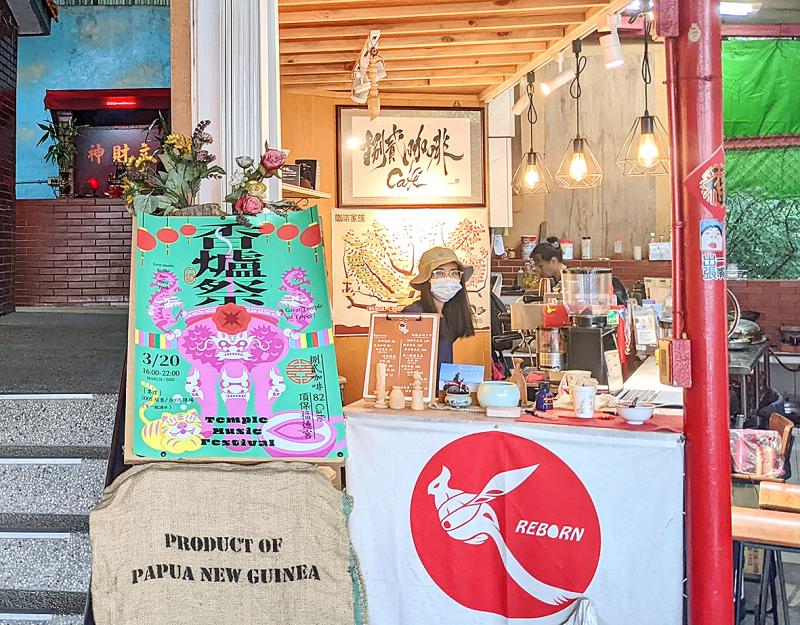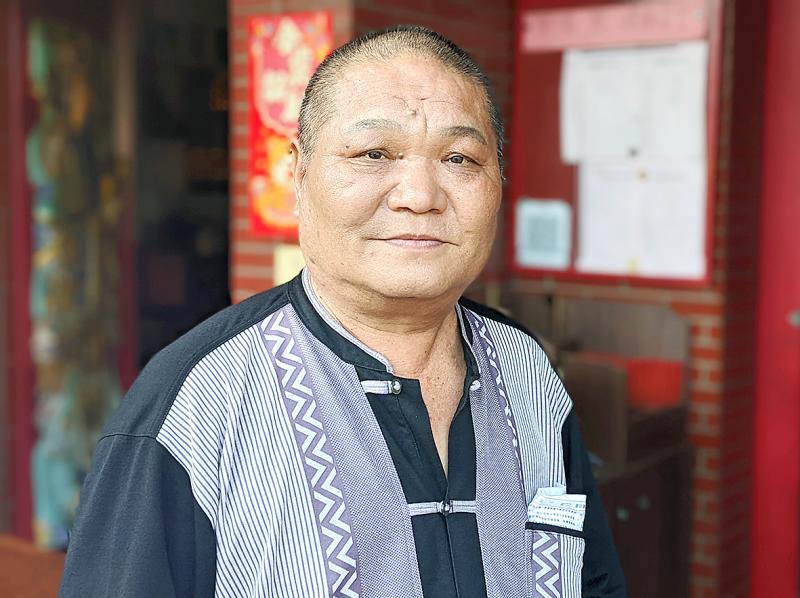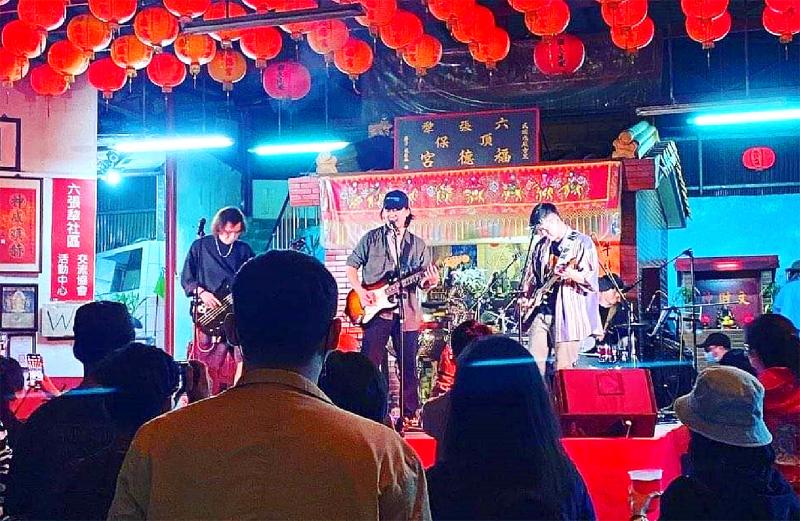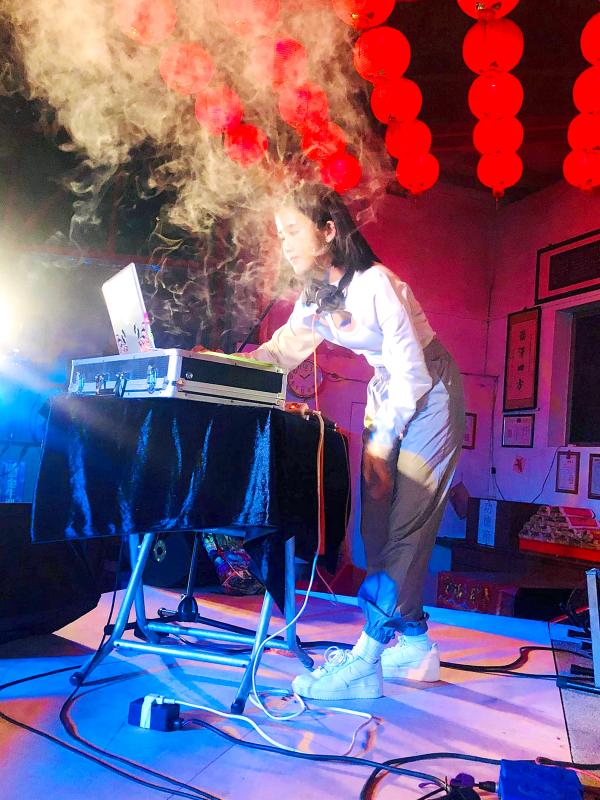Sandy Wang (王敏馨) always asks the Earth God for permission before she puts on a music festival. It’s in his house after all.
“You can’t just barge into someone’s home, have a party and leave,” her husband Yi Hung-yi (易谹義) says. “People still pray here, and you have to be respectful.”
The Earth God decided that this year’s Temple Music Festival (香爐祭) will fall on Sunday, with seven acts spanning genres such as J-rock, Hakka punk and Bouzouki dub.

Photo: Han Cheung, staff reporter
The festivities will be held in the main hall, which is already a sort of recreation center for locals with daytime karaoke, a coffee shop and rechao (熱炒, fast stir-fried dishes). Tucked behind an isolated hillside parking lot at the edge of Taipei’s bustling Daan District, Dingbao Fude Temple (頂保福德宮) was once renowned for revealing winning lottery numbers. Today, few venture this way, even though there’s an MRT stop just six to eight minutes walk away.
Wang has run a branch of her 82 Coffee Shop here for about two years now, coming here after finishing up at the main location in nearby Chenggong traditional morning market (成功市場).
Landowner Chang Shih-wen (張世文) doesn’t mind the ruckus — it’s good for the temple, whose fortunes have declined in the past seven or eight years. “Actually I told them they should do more of these, maybe once every two weeks,” he says.

Photo: Han Cheung, staff reporter
Having put on two festivals here already — the first one was held on a tiny platform on the hill behind the shrine — Wang knows that it’s not possible.
“This is just a hobby; I enjoy infusing art into what I do,” she says. “I thought that I’d bring that atmosphere here too. I also hope that traditional culture can be passed down in Taiwan, especially regarding temples — the craftsmanship, the embroidery, it’s all fantastic.”
GOD FROM A FLOOD

Photo courtesy of Temple Music Festival
The sound of people singing Hoklo (commonly known as Taiwanese) love songs echoes through the main hall of the temple on a Tuesday afternoon. This spot has been a local hangout for decades, and Wu serves coffee to the crooners as well as a group of National Taiwan University students doing field research on nearby military dependent Dawo New Village (大我新村).
Wu started her coffee business at Chenggong Market, where Yi helps run his family’s fish cake stall, but needed more hours since the market closes at 2pm. She expanded to a larger space in Yongho District (永和), where she began hosting various performances and met the scensters who helped organize the music festival.
Wang and Yi knew Chang as patrons of his Zihao Temple (紫昊巖), which is just down the path, closer to the main street. After Wang shuttered the Yongho store, Chang asked if she wanted to start something in the temple. She set up shop here with her mother, who is in charge of the kitchen, and they kept the karaoke running.

Photo courtesy of Temple Music Festival
Every temple has a miraculous founding story, and Dingbao Fude Temple is no different. The 64-year-old Chang recalls how his seven nephews were caught in a flood decades ago while returning from their aunt’s house in Taipei’s Wanhua District (萬華). Along the way, they found an Earth God statue in the water.
Chang first told them to get rid of it.
“I told them not to mess with discarded deities, but they didn’t listen and brought it to where the temple is now, where people used to drink tea,” he says. The kids built a makeshift structure with rocks and sheet metal to house the deity, and it stayed in the community.
RISE AND FALL
At the height of the Patriotic Lottery craze in the 1980s, Chang says a couple saw a vision of an Earth God, who gave them the numbers to win the jackpot of NT$6 million. The god also revealed his location, and after the couple finally found the makeshift shrine, they donated part of their winnings to help build a proper temple.
Word spread, and the people flocked here in hopes of getting rich.
“This place was crowded like a night market,” Chang says.
The lottery was shut down in 1987 due to widespread illegal betting, but the temple remained popular until about a decade ago, Chang says.
“The Earth God is now waiting for the right person to help it realize its full powers again,” he says. “Now it’s just like this, not prosperous but not struggling terribly either.”
Locals say that the temple is still quite lively during the weekends as a local hangout spot, and Wang says they attend the music festival too. She’s still getting her name out, but due to the popularity of temple culture these days, there have been more curious folks venturing here after seeing it online.
“I can’t say how special our music festival is,” Wang says. “But I can say we have a very special venue.”

In the March 9 edition of the Taipei Times a piece by Ninon Godefroy ran with the headine “The quiet, gentle rhythm of Taiwan.” It started with the line “Taiwan is a small, humble place. There is no Eiffel Tower, no pyramids — no singular attraction that draws the world’s attention.” I laughed out loud at that. This was out of no disrespect for the author or the piece, which made some interesting analogies and good points about how both Din Tai Fung’s and Taiwan Semiconductor Manufacturing Co’s (TSMC, 台積電) meticulous attention to detail and quality are not quite up to

April 21 to April 27 Hsieh Er’s (謝娥) political fortunes were rising fast after she got out of jail and joined the Chinese Nationalist Party (KMT) in December 1945. Not only did she hold key positions in various committees, she was elected the only woman on the Taipei City Council and headed to Nanjing in 1946 as the sole Taiwanese female representative to the National Constituent Assembly. With the support of first lady Soong May-ling (宋美齡), she started the Taipei Women’s Association and Taiwan Provincial Women’s Association, where she

It is one of the more remarkable facts of Taiwan history that it was never occupied or claimed by any of the numerous kingdoms of southern China — Han or otherwise — that lay just across the water from it. None of their brilliant ministers ever discovered that Taiwan was a “core interest” of the state whose annexation was “inevitable.” As Paul Kua notes in an excellent monograph laying out how the Portuguese gave Taiwan the name “Formosa,” the first Europeans to express an interest in occupying Taiwan were the Spanish. Tonio Andrade in his seminal work, How Taiwan Became Chinese,

Mongolian influencer Anudari Daarya looks effortlessly glamorous and carefree in her social media posts — but the classically trained pianist’s road to acceptance as a transgender artist has been anything but easy. She is one of a growing number of Mongolian LGBTQ youth challenging stereotypes and fighting for acceptance through media representation in the socially conservative country. LGBTQ Mongolians often hide their identities from their employers and colleagues for fear of discrimination, with a survey by the non-profit LGBT Centre Mongolia showing that only 20 percent of people felt comfortable coming out at work. Daarya, 25, said she has faced discrimination since she